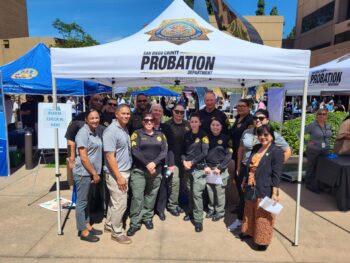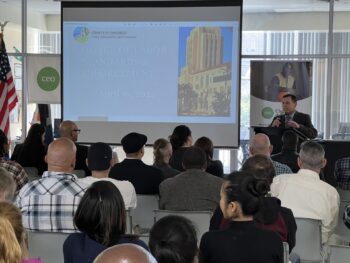Imagine getting a notification that your teenage son or daughter is in trouble and needs to appear in court. Adding to that stress, court documents provided to you are full of legal terms you don’t understand.
That’s when the Family Advocates step in at Juvenile Court. The retired probation officers can help translate legalese into English or Spanish.
“We know how difficult it can be for a family when a child has contact with the juvenile justice system. We also know the importance of engaging the family to help youth on probation succeed One of the ways we are trying to do that is by working with families to help them understand and successfully complete court and probation requirements,” said Chief Probation Officer Mack Jenkins.
The San Diego Association of Governments surveyed more than 400 people who used the Family Advocate program in 2012 and recently released its results. The survey found:
· 93 percent of families felt “very satisfied” with the advocates
· 92 percent felt they had a better understanding of the juvenile court process and knew what was required of them
The survey noted that nearly two-thirds of those who responded were Latino and 42 percent of them said Spanish was the primary language in the home.
One survey respondent wrote, “Thank you for having someone that speaks our language.”
Family Advocate Manuel Pacheco, who retired after 25 years in the Probation Department, has been part of the program since it started in 2010.
Related Video: Juvenile Hall Tour
Parents and juveniles in court often only hear one or two things that a judge says and then they get so fixated on those things they don’t hear the entire order, Pacheco said. He likens it to when a mechanic tells people what they need to do to a car or when a medical doctor gets too technical.
Pacheco’s job is to go over specific court orders to make sure all is clear. He spends between 10 to 15 minutes with each family to make sure they understand the next steps.
“Before they leave the building, they know exactly what they need to do, so they can leave on the right foot,” Pacheco said.
While Pacheco is bilingual, he said he is there to help anyone who asks. He also does not consider himself just a translator. He is primarily a probation officer, and he does his best to make sure the juveniles understand they can get past their mistake.
“I feel it’s an opportunity to reach the kids,” Pacheco said.
He explains the terms of probation and encourages juveniles to report to their probation officer, avoid gangs and drugs, work harder in school and follow curfew or car restrictions.
Often when a juvenile is ordered into custody, parents are just as scared as their child, and may be emotional.
Pacheco said he talks to them about how the various probation programs work including counseling and classes for drug treatment, better decision-making and anger management. Usually, once the parents learn about these programs, they realize the programs can be beneficial to their troubled child.
“I have to tell the parents that if their kid plays their cards right, they are going to come out better than they started. A lot of times good comes out of bad,” he said.
Getting in trouble could be the impetus that straightens a young person out, Pacheco said.
“Most kids learn their lesson and we never see them again,” he said. “I think we provide a great service. I’m proud to be part of it.”
The Family Advocates work Monday through Friday at the Juvenile Court.






